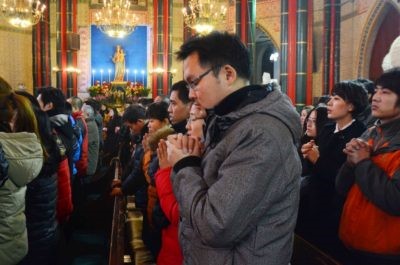– Rev José Mario O Mandía
“Do you also wish to go away?” (John 6:67), Jesus asked the twelve, after many of his listeners “drew back and no longer went about with him” (John 6:66). They had found his words on eating His flesh and drinking His blood just too much to stomach. Crazy Rabbi! He’s out of his mind!
Jesus said that we could do nothing without Him, so He gave us His very self as Food, and comes down to our altar every time Mass is offered. Every single Mass has infinite value, because the Priest (the one who offers) and the Victim (the one offered) is Jesus Christ. There is no prayer in the world that packs more power than the one offered by Jesus Himself. This is why the saints loved the Holy Sacrifice of the Altar.
Bishop John McGee, secretary to three Popes (Bl Paul VI, John Paul I, and St John Paul II), narrates that just shortly after John Paul I became Pope, he told Msgr McGee, “Would you do me a favor tomorrow morning?”
“Anything you want, Holy Father.”
“Would you celebrate Mass for me?”
“Holy Father, I have been celebrating Mass every day for you.”
“No, I don’t mean that. Would you celebrate Mass and allow me to be your altar server?”
“Holy Father, I couldn’t do that!”
“But it’s the Pope who asks you!”
That’s how Bishop McGee ended up with a Pope as altar server.
John Paul II, speaking to seminarians, once said that whether one be a pope, or a bishop, or a priest, the most important thing is to be able to celebrate Mass and to hear confessions.
St Josemaría taught that the Mass is the “center and root” of the Christian life. The 2nd Vatican Council echoed this teaching when it declared the Mass to be the “summit and source” of the life of the Church.
At Mass, we are not passive onlookers. Jesus Christ requires our active participation. How? By making of ourselves offerers and offerings.
St Peter Chrysologus (380-450) said, “How marvellous is the priesthood of the Christian, for he is both the victim that is offered on his own behalf, and the priest who makes the offering. He does not need to go beyond himself to seek what he is to immolate to God: with himself and in himself he brings the sacrifice he is to offer God for himself.”
And Origen (184/185 – 253/254) wrote: “If I renounce everything I possess, if I carry the cross and follow Christ, I have offered a holocaust on the altar of God. Or if I burn up my body in the fire of charity …, I have offered a holocaust on the altar of God…; if I mortify my body and abstain from all concupiscence, if the world is crucified unto me and not me unto the world, then I have offered a holocaust on the altar of God and I am become a priest of my own sacrifice.”
Finally, an appeal to all. Saint Josemaría once wrote: “I ask all Christians to pray earnestly for us priests that we learn to perform the Holy Sacrifice in a holy way. I ask you to show a deep love for the Holy Mass and in this way to encourage us priests to celebrate it respectfully, with divine and human dignity: looking after the cleanliness of the vestments and other things used for worship, devoutly, without rushing. Why the hurry? Do people in love hurry when they are saying goodbye? They seem to be going and then they don’t go; they turn back once and again; they repeat quite ordinary words as if they had just discovered their meaning …” (Homily “A Priest Forever”)


 Follow
Follow


